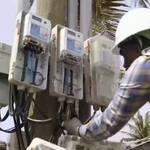Modalities are being finalized to introduce another concession agreement into the operations of the Electricity Company of Ghana (ECG).
This is part of the Energy Sector Reform Programme (ESRP) to reduce power sector financial shortfall, improve ECG operational performance and fully implement tariff reforms to ensure quarterly adjustments for cost-recovery.
This private sector participation is being finalized after the one pursued through the Millennium Challenge Corporation (MCC) power compact was embroiled in controversies and subsequently cancelled in 2019.
The disclosure of plans regarding Private Sector Participation (PSP) in ECG is in the full document covering the $3 billion balance of payment support agreement Ghana signed with the International Monetary Fund (IMF).
PDS Concession debacle
On March 1, 2019, Ghana Power Distribution Services, Ltd. (PDS) assumed operation and management of the staff and assets of ECG under a 20-year concession agreement.
PDS was suspended after the government said it suspected the agreement covering the concession was tainted with fraud.
The transaction advisor, Millennium Development Authority (MiDA), set up an investigative body into the allegations and cleared PDS of fraud.
On October 19, 2019, the Government of Ghana informed the Millennium Challenge Corporation (MCC) in Washington, D.C. of its decision to terminate the concession agreement between ECG and private operator Power Distribution Services Ghana Ltd (PDS).
The United States of America notes this decision with regret. Based upon the conclusions of the independent forensic investigation, the U.S. position is that the transfer of operations, maintenance, and management of the Southern Distribution Network to the private concessionaire on March 1, 2019, was valid, and therefore the termination is unwarranted.
As such, MCC confirmed that the $190 million funds granted to Ghana at the March 1 transfer to the 20-year concession from ECG to PDS are no longer available.
Rationale for reforms
Explaining the need for the reforms, the document said shortfalls in the energy sector have been significant due to below-cost-recovery tariffs, large distribution losses, and excess capacity amid take-or-pay contracts.
This has cost the government some two percent of Gross Domestic Products (GDP) in transfers per year since 2019 and has also led to accumulation of payables to Independent Power Producers (IPPs) and fuel suppliers.
$937.5m capacity charges in 4 years
Government paid $937.5 million to three independent power producers (IPPs) for excess capacity charge between 2017 and 2020.
World Bank helping with the reforms
Updating the ESRP is being conducted with the help of the World Bank, focuses on expediting Purchasing Power Agreements renegotiations (to reduce the take-or-pay liability), tariff adjustments, improving operational performance of energy State Owen Enterprises (SOEs), reforming subsidies to reduce the revenue shortfall, and formulating a strategy (with clear benchmarks) on the reduction of distribution losses and improving collections.
The plan will entail estimating investment requirements for upgrading equipment and systems, finalizing the modalities of private sector participation in the distribution sector, and fast-tracking installation drive for pre-paid meters.
The authorities will further enhance transparency in the tariff determination process, including by publishing technical notes explaining and justifying final tariff decisions.
They will also develop and operationalize a framework to guide the granting of energy sector subsidies.
The Power Utilities Regulatory Commission (PURC) recently raised electricity tariffs by close to 30% (prior action), bringing the cumulative increase since mid-2022 to 57%, to help reduce the cost-recovery gap and limit this year’s shortfall to around 2.7% of GDP offsetting underlying upward pressures from a more depreciated exchange rate.
Additional quarterly tariff adjustments will be implemented in 2023 to compensate for any exchange rate and price movements and to bring tariffs close to cost-recovery level, while efforts to improve operational efficiency of energy distribution as planned in the ESRP and the renegotiation of contracts with IPPs are expected to further reduce costs.
Beyond 2023, the programme’s baseline projections conservatively assumes that the sector shortfall will be gradually reduced to reach 1.7% of GDP in 2026 (assuming modest tariff adjustments and slight improvement in grid/recovery losses).
IMF staff urged government to aim at a more rapid reduction in the sector shortfall under the ESRP to create fiscal space for priority spending.
This could be notably achieved through additional ad-hoc tariff increases while protecting vulnerable households.
Details of Energy Sector Reforms
Our overarching goal is to introduce more efficiency in the energy sector and make energy pricing more cost reflective.
Over the course of the medium term, we will fulfill this objective by fully implementing the Energy Sector Reform Programme to reduce power sector financial shortfall, improve ECG operational performance and fully implement tariff reforms to ensure quarterly adjustments for cost-recovery.
Specific interventions which will be jointly overseen by MoF and MoEn include:
- Implementing an upfront weighted-average electricity tariff adjustment of at least 29 percent in January 2023 (prior action) to limit the size of the energy sector shortfall.
This will be followed by quarterly tariff adjustments reflecting exchange rate, inflation and fuel price changes.
- Publishing the new tariff setting guidelines for electricity distribution and supply (PURC).
- Publishing technical notes to explain and justify quarterly tariff decisions to promote transparency within 30 days of the decision announcement.
- Publishing the updated Energy Sector Recovery Plan, after Cabinet approval, with well-identified measures and timelines by June 2023 (structural benchmark).
We will conclude PPA renegotiations (to reduce the take-or-pay liability), formulate a strategy to improve ECG’s performance (with operational benchmarks), improve operational performance of other SOEs, and reform subsidies to reduce the revenue shortfall.
- Publishing a new policy directive on procurement of new IPPs to mitigate the commercial burden on the state by end-2023.
- Establishing a framework to improve operational efficiency of ECG/PSP and NEDCo to meet KPIs set by SIGA, EC, PURC and MoEn by end-March 2024.
The guidelines for preparing the performance improvement plan will be completed and performance contract between SIGA and ECG (particularly aiming at reduction in grid and bills’ recovery losses) will be completed by end-June 2023.
Among other measures, the framework would entail estimating investment requirements for upgrading equipment and systems, finalizing the modalities of private sector participation (a concession agreement), and fast-tracking installation drive for pre-paid meters.
- Ensuring transparency in gas supply agreements (GSA) by GNPC and seek justification in case large variations are found in contracted prices for different customers by end-2023.
In this context, we will put previous GSAs for a review, where substantially large discounts were given to certain customers/entities.
- Developing and operationalizing a framework in consultation with the Fund staff to guide the granting of energy sector subsidies by end-June 2023.
The framework will also cover a mechanism to fully or partially insulate vulnerable population from large tariff increases.
To this end, we will redesign lifeline tariffs, initiate a mapping exercise to measure the impact of existing cash transfer program on poor households with electricity access, and expand the scope of the program if needed.
- Publishing the integrated power sector masterplan that lays out a clear strategy and actionable items synchronized with updated demand-supply forecasts by end-June 2023.
- Implement an inter-utility debt settlement framework on a quarterly basis starting from June 2023
- IPP power plant verification audit will be completed by end-June 2023 to ensure transparent billing. In addition, merit dispatch order will be monitored on a regular basis to ensure cheaper electricity goes first on the grid.
- Establishing a framework to address payment of Volta Aluminium Company (VAlCo) electricity bills by end-June 2023.
- Completing the categorization of MDAs into strategic and non-strategic, installation of pre-paid meters to non-strategic MDAs, and allocation of budget to pay for strategic MDAs by endJune 2023.
- Developing and operationalizing a regulatory financial reporting framework by end-June 2023.
- Implementing a mechanism to enforce the guidelines of the CWM and NGC by end-June 2023




